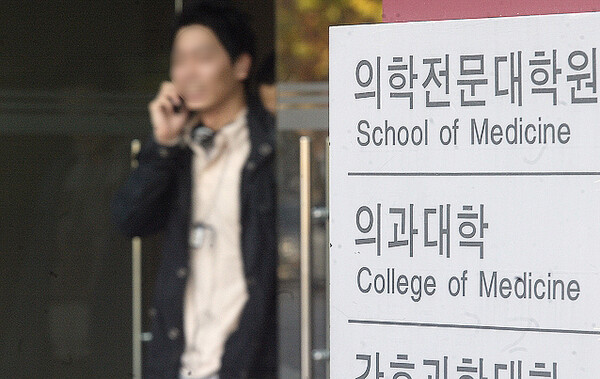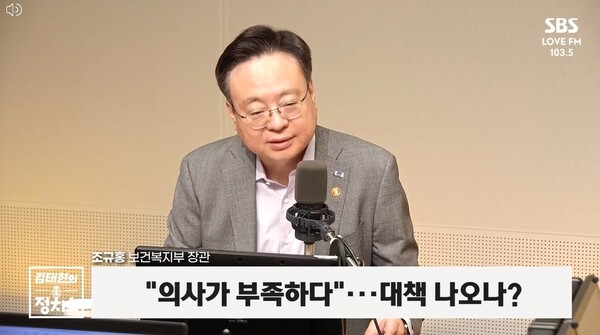
The government is firmly determined to increase the medical school enrollment quota from the current 3,058. It has also set the timing of the increase for the 2025 academic year.
“The number of doctors per 1,000 people in Korea is lowest among OECD countries,” Minister of Health and Welfare Cho Kyoo-hong said at an SBS Radio news show. “The government will push for it (increasing medical school enrollment quota) with a strong will.”
Cho noted that there are allegations that Korea does not need to increase doctors because of its dwindling population.
“However, given the growing need for healthcare service due to population aging, it is certain Korea is short of physicians,” he said. “We'll do everything we can to reflect the current situation in the 2025 medical school enrollment quota.”
Cho acknowledged strong resistance from the medical community, but it is a negotiable issue.
Commenting on the non-face-to-face medical treatment pilot project, which is also being opposed by the medical community along with the expansion of medical school students, Minister Cho said that if there is a problem in the process, the government will immediately supplement shortcomings.
"I think the government can discuss (increasing medical school student number and piloting non-face-to-face care) with the medical community because we have the same goal of protecting people's health and improving health,” Cho said.

Cho made it clear that the government will limit telemedicine targets to returning patients rather than first-timers, and even if it is non-contact, doctors can strongly recommend visits to medical institutions if they need a face-to-face consultation.
The government has allowed the handling of narcotics and other drugs on a strictly limited basis and made it mandatory for patients to receive drugs directly or through proxies to prevent wrong delivery and damage to drugs, he added.
"Given these safeguards, we believe we are not behind major countries, but if problems occur during the pilot project, we will immediately correct them," he said.
‘Strengthen infrastructure to fill a void in emergency, pediatric care’
Commenting on recent series of emergency patient deaths due to failure to find emergency rooms available, Minister Cho cited the "overcrowding of emergency rooms with mild cases" and the "shortage of beds due to surgery."
To address the problem, the government plans to establish regional control towers to prioritize severe emergency patients while transferring mild patients to emergency rooms below the level of a community emergency medical center.
In addition, it will expand medical infrastructure by, for instance, improving working conditions to address the skewed distribution of physicians to the Seoul metro region and some specific medical departments, he added.
"We will provide additional support for information management so that people can see real-time information on ER situations through a comprehensive app rather than calling each hospital to check the availability of beds,” he said.
Since the number of childbirth patients will decrease, the nation should implement a post de facto reimbursement system to complement the fee-for-service system and introduce a regional calculation system to minimize differences between regions and medical departments through more reasonable compensation, Cho added.
Asked how the government will prevent medical void in pediatric and adolescent treatments, Cho said, “We will expand Moonlight (late-night) Children's Hospital and seek ways to collaborate between metropolitan and rural hospitals to treat critically ill children.”
Related articles
- Bumpy road ahead for planned increase of medical student quota
- Expert urges increase in medical students to address essential care crisis
- ‘Doctors must not oppose every reform proposal disadvantageous to them’
- ‘Increase medical school enrollment quota by reducing oriental doctors’
- [Analysis] Why do Korean students obsess over admission into medical schools?
- Korea has fewer doctors and medical students, but healthcare use is on top, OECD says

